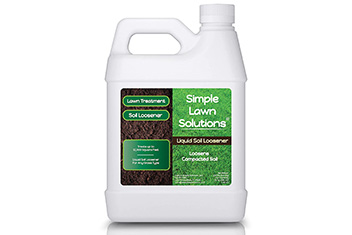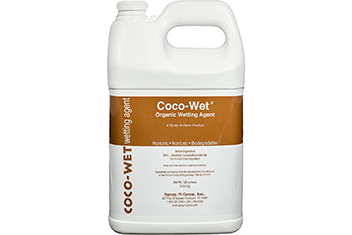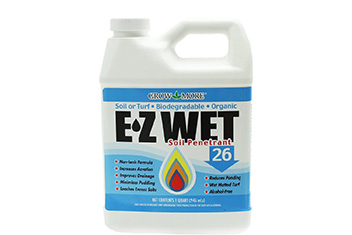Are you concerned about the brown patches in your lawn? Do you water regularly but still see no improvement? Are you concerned about the brown patches in your lawn? Do you water regularly but still see no improvement? It may be time to consider using a wetting agent for your lawn and soil.
One way to achieve this is by using a lawn wetting agent. But with so many wetting agents on the market at home improvement stores like Home Depot, Lowes and Amazon it can be hard to choose the right one for your grass and soil type.
Wetting agents help water penetrate the soil, making it available for your grass roots. In this guide, we’ll show you how to choose the best wetting agent for your lawn. We’ll also provide some tips on watering and maintaining your lawn. With a little care, you can have a green, healthy lawn that will be the envy of your neighborhood. Let’s get started!
In This Guide
What is a Lawn Wetting Agent?
A lawn wetting agent is a product designed to improve the water-holding capacity of soil. It helps water penetrate the soil, making it available for your grass roots. These products are typically applied in liquid or granular form and can be found at home improvement stores such as Home Depot, Lowes and Amazon.
A wetting agent will improve the quality of your grass by increasing the water availability to your grass roots. It helps reduce water run-off, improve nutrient uptake and encourage root growth.
How Does a Wetting Agent Work?
Wetting agents are surface active molecules that help water penetrate the soil more easily by reducing the surface tension of the water droplets. This allows them to spread out over the soil surface, making it easier for the water to penetrate into the ground and increasing water retention.
The active ingredient in most wetting agents is a surfactant called a hydrophilic polymer. These molecules have an end that attracts water (hydrophilic) and an end that repels water (hydrophobic). When these are applied to the soil the polymers help the water to spread, adhere to root particles and penetrate deeper into the soil.
Best Wetting Agents for Lawns
Simple Lawn Solutions Store Liquid Soil Loosener

Our pick for the best all around soil wetting agent is the Simple Lawn Solutions Store Liquid Soil Loosener. This loosening agent is a powerful blend of natural ingredients that helps to break up compact soil and increase water penetration. It works well in many types of soils from sandy to clay-rich, adding organic matter that helps the soil retain moisture for longer periods of time.
Another reason we like this wetting agent is that it works on all types of soils and grasses including: Bermuda, St. Augustine, Zoysia, Buffalo, Centipede, Florida Palmetto, Bahia, Fescue, Ryegrass & Kentucky Bluegrass.
Spray-N-Grow Wetting Agent

Spray-N-Grow Wetting Agent is another top choice for lawn wetting agents. We like this bottle because it can be applied directly to the soil or diluted in water and used as a foliar spray.
It is made from natural ingredients and contains no harsh chemicals, making it a safe choice for your lawn. The wetting agent works by penetrating the soil surface, allowing more water to enter deeper into the soil profile.
Grow More E-Z Wet Soil Penetrant

The Grow More E-Z Wet Soil Penetrant is a good choice for lawns with clay-rich soils. This wetting agent helps to break up the clay particles and make it easier for water to penetrate deep into the soil profile.
It also contains a combination of nutrients, which can help promote root growth and lush green grass with the Non-ionic formula and materials like mulch, sawdust, peatmoss and steer manure.
Another reason we like this wetting agent is that it promotes deep root growth. This is important because deeper roots can access moisture and nutrients more easily, which helps your lawn withstand periods of hot weather or drought.
Wetting Agents for Turf Grass
One questions homeowners with turf lawns often ask us is “What is the best wetting agent for turf grass?” When it comes to turf grass, we recommend using products designed specifically for turfgrass such as Grow More E-Z Wet Soil Penetrant. This product helps reduce water run-off and helps water penetrate more deeply into the soil profile.
How To Apply Soil Wetting Agents
Soil wetting agents can be applied in a variety of ways, depending on the product you are using. Many products come with instructions for application, and it’s important to follow these instructions carefully. Generally speaking, wetting agents should be applied directly to the soil surface or mixed with water and sprayed over the lawn.
When applying a granular wetting agent, the best method is to spread it over the lawn with a fertilizer spreader. For liquid wetting agents, you can spray or pour them on the soil surface and then water the area lightly so that it is absorbed into the soil like other lawn care fertilizers.
One common mistake that many homeowners make is to apply too much wetting agent to a localized dry spot. Over-applying can cause water run-off which will lead to pooling and other problems. Make sure you follow the instructions on the package carefully, as applying too much could damage your lawn.
How to Pick the Right Wetting Agent
When choosing a wetting agent for your lawn, it’s important to consider several factors such as soil type, turf grass species and climate. Different types of wetting agents are better suited for certain conditions. Here is what our team at Whack Your Weeds recommends to get the best results!
One of the most important things to consider when picking a wetting is your soil profile. Different regions of the country have different soil types which can impact water repellency and retention.
Most Common Soil Types
- For sandy soils, look for wetting agents with a high surfactant content as these will help water penetrate the soil more effectively.
- In clay soils, use a wetting agent with potassium humate or lignosulfonates as these are known to improve water-holding capacity and reduce run-off. If
- you have a warm climate, look for products that contain polymers as they can help the soil retain moisture.
- For cool climates, choose wetting agents with calcium or magnesium salts to help the water penetrate and stay in the soil longer.
- For warmer climates in the South we recommend using wetting agents with surfactants, as these will help the water penetrate deep into the soil.
Wetting Agents and Soil Types
| Soil Type | Recommendations |
|---|---|
| Sandy Soil | Sandy soils have a very low water-holding capacity, so it is important to use wetting agents that will help the soil hold onto water for longer periods of time. Choose products with surfactants or polymers as these are designed to increase water absorption. |
| Clay Soil | Clay soils can be difficult to penetrate with water due to their high clay content. Use a wetting agent with potassium humate or lignosulfonates, as these will help the water penetrate more easily and reduce run-off. |
| Silt Soil | Silt soils can be improved with the use of wetting agents that contain calcium or magnesium salts. These help the water to penetrate more easily and stay in the soil for longer. |
| Loamy Soil | Loamy soil is a combination of clay, silt and sand, so it’s important to choose a wetting agent that can help the water penetrate all three types of soil. Look for products with polymers or surfactants as these are designed to provide deep water penetration. |
Wetting Agents and Dry Spots
A dry spot or patch in your lawn may be caused by poor water penetration or hydrophobic soil. Applying a wetting agent will help the water to penetrate deeper into the soil and reach the grass roots. Make sure to apply the product at least twice per year, once in spring and again in fall, to ensure that your lawn is getting enough moisture.
Benefits of an Organic Wetting Agent
Organic wetting agents are made from natural ingredients and can provide several benefits to your lawn and dry watches. They are gentle on the environment which means they won’t harm beneficial soil organisms or disrupt the local ecosystem.
Another benefit is that organic wetting agents also don’t contain any harsh chemicals, making them safer for children and pets. Some types of grass like bentgrass and bluegrass are more susceptible to damage from synthetic wetting agents so using an organic product is a smart choice.
Finally organic wetting agents often cost less than synthetic alternatives. This is because they are made from natural ingredients and don’t require the same amount of processing as chemical-based products. Organic compounds are better than synthetic chemicals at helping grass absorb moisture, so you can get the same results for less money.
In conclusion, when it comes to choosing the right wetting agent for your lawn there are several factors to consider. It is important to take into account your soil profile and climate so that you can select a product that is best suited for your
Frequently Asked Questions
How often should you apply wetting agents?
You should apply wetting agents according to the instructions on the package. Generally speaking, it’s best to apply them every 6-8 weeks during growing season and once or twice a year in dormant periods.
Do wetting agents damage grass?
No, if used correctly, wetting agents should not damage your grass. However, over-applying can cause water run-off which can damage your lawn or foundation.
When is the best time to apply a wetting agent?
The best time of year to apply a wetting agent is usually during the spring or summer months. This is when grass and plants are actively growing and need more water. Applying a wetting agent in these months will help soils absorb more moisture to promote growth.
